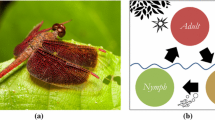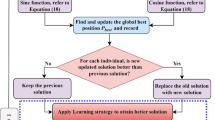Abstract
This paper presents a hybrid genetic algorithm and particle swarm optimization (HGAPSO) for solving optimal power flow problem with non-smooth cost function and subjected to limits on generator real, reactive power outputs, bus voltages, transformer taps and power flow of transmission lines. In (HGAPSO), individuals in a new generation are created, not only by crossover and mutation operation as in (GA), but also by (PSO). The effectiveness of this algorithm is examined and tested for standard IEEE 30 bus system with six generating units. The results of the proposed technique are compared with that of PSO and other methods reported in the literature.









Similar content being viewed by others
Abbreviations
- F T :
-
Cost function
- P G :
-
Real power output
- P min :
-
Real power min
- P max :
-
Real power max
- V j,k :
-
Current velocity
- X j,k :
-
Current searching point
- W :
-
Inertia weight
- c 1, c 2 :
-
Are two positive constants
- r 1, r 2 :
-
Are two randomly generated numbers [0, 1]
- X pbest :
-
Best position of particle
- X gbest :
-
Best position among all individuals in the population
References
Abido M (2002) Optimal power flow using particle swarm optimization. Electr Power Energy Syst 24:563–571
Acharjee P, Goswami S (2010) Multiple power flow solutions using particle swarm optimization with embedded local search technique. World Acad Sci Eng Technol 67:221–228
Benattous D, Labbi Y (2009) Particle swarm optimization based optimal power flow for units with non-smooth fuel cost functions. In: Eleco 6th International conference on electrical and electronics engineering papers, IEEE, Bursa
Esmaeili A, Esmaeili S, Goroohi A (2012) Optimal allocation of SVC and TCSC for improving voltage stability and reducing power system losses using hybrid binary genetic algorithm and particle swarm optimization, Canadian. J Electr Electron Eng 3:3
Kennedy J, Eberhart R (1995) Particle swarm optimisation. In: Proceedings IEEE international conference on Neural Networks, IEEE, Perth, pp 1942–1948
Mimoun Y, Benhamida F (2011) Genetic algorithm-particle swarm optimization (GA-PSO) for economic load dispatch. Prezeglad Elektrotechniczny, ISSN 0033–2097, R. 87 NR 10/2011
Narmatha Banu R, Devaraj D (2009) Enhanced genetic algorithm approach for security constrained optimal power flow including FACTS devices. Int J Electr Electron Eng 3:9
Nithiyananthan K, Ramachandran V (2011) Enhanced genetic algorithm based model for power system optimal load flow,” Int J Comput Appl Eng Sci. ISSN: 2231–4946, 1(2)
Sudhakaran M, Ajay P, Palanivelu T (2007) GA and PSO culled hybrid technique for economic dispatch problem with prohibited operating zone. J Zhejiang Univ Sci 8(6):896–903. doi:10.1631/jzus
Thitithamrongchai C, Eua-arporn B (2007) Self-adaptive differential evolution based optimal power flow for units with non-smooth fuel cost functions. J. Electr Sys 3–2:88–99
Todorovski M, Dragoslav R (2006) An initialization procedure in solving optimal power flow by genetic algorithm. IEEE Trans Power Syst 21(2):480–487
Tomohiro H, S. Kenji, T. Hitoshi (2009) “Hybrid algorithm for Hammerstein system identification using genetic algorithm and particle swarm optimization”. World academy of science engineering and technology 9(5):456–461
Vijayakumar K (2011) Genetic algorithm for Solving optimal power flow problem with UPFC. Int J Softw Eng Appl 5(1):39–49
Wannakarna P, Khamsawangb S, Pothiyab S, Jiriwibhakornb S (2010) Optimal power flow problem solved by using distributed sobol particle swarm optimization, 978-1-4244-5607 ECTI
Yi-Tung K, Erwie Z (2008) Ahybrid genetic algorithm and particle swarm optimization for multimodal functions. Sci Direct Appl Soft Comput 8:849–857
Younes M, Rahli M, Koridak A (2007) Optimal power flow based on hybrid genetic algorithm. J Inform Sci Eng 23:1801–1816
B. Zhao, Y. Cao, (2005) “Multiple objective particle swarm optimization technique for economic load dispatch,” J Zheijiang Univ Sci. ISSN 1009–30095,6:420–427
Author information
Authors and Affiliations
Corresponding author
Rights and permissions
About this article
Cite this article
Gacem, A., Benattous, D. Hybrid genetic algorithm and particle swarm for optimal power flow with non-smooth fuel cost functions. Int J Syst Assur Eng Manag 8 (Suppl 1), 146–153 (2017). https://doi.org/10.1007/s13198-014-0312-8
Received:
Revised:
Published:
Issue Date:
DOI: https://doi.org/10.1007/s13198-014-0312-8




